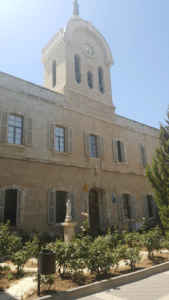
By: Sarah Garwood

The Fordham University International Political Economy and Development (IPED) program has graciously provided me with funding to further my studies in Arabic language via the Language Immersion Studies Awards (LISA). Having already been acquainted with the fundamentals of the Arabic language between my studies at Fordham as an undergraduate and my study abroad experience in Jordan, I was thrilled to take this opportunity to enhance my linguistic ability in pursuit of professional proficiency. I firmly believe that there is no better way to truly master a language than immersion, forcing yourself to converse in your non-native tongue on a daily basis. In a few weeks, here I have made enormous leaps and bounds in my language ability.

I have chosen to do my immersion in two different locations, the West Bank city of Bethlehem and the Druze village of Daliyat El Karmel. For my first month of intensive language learning, I studied at Bethlehem University, spending most of the day in the classroom during week and utilizing my lessons extensively on weekend excursions to nearby cities in the Palestinian Territories. Bethlehem University is a renowned institution with a strong Arabic language department under the auspices of Dr. Moin Halloun, a specialist in Palestinian Arabic. For my second month of language immersion, I embedded myself within a Druze village on Mount Carmel. Living here for a month has provided me with a unique insight into Druze society and familiarized me with the dialectal idiosyncrasies of the Syrian Arabic which is spoken here. Living in a host family setting here where Arabic is exclusively spoken ensures that my learning continues outside the classroom. In-country language learning is particularly important for Arabic as it is a language with regional dialects that differ substantially from the formal Modern Standard Arabic used in professional settings and the media. Consequently, students outside the Arab world can spend years studying a language in their home countries only to find their Arabic nearly useless for conversational purposes on the ground. There are major differences in letter pronunciation, vocabulary, verbs, sentence structure, and grammar that one cannot adjust to without immersion. Immersion has allowed me to hone my speaking and listening skills in practical settings and for realistic purposes.

Focusing on practical skills such as language learning has become increasingly more important in a world where the global migration level, and consequently cross-cultural contact, is at its highest in decades. The IPED program’s holistic approach to educating development professionals empowers them to handle complex challenges with pragmatic solutions. A key component of these solutions involves communication and linguistic competency. I strongly encourage future IPED students to take on the task, albeit tremendously challenging, of learning another language for professional purposes. Doing so will undoubtedly compliment the other practical skills that the IPED program stands to offer.
